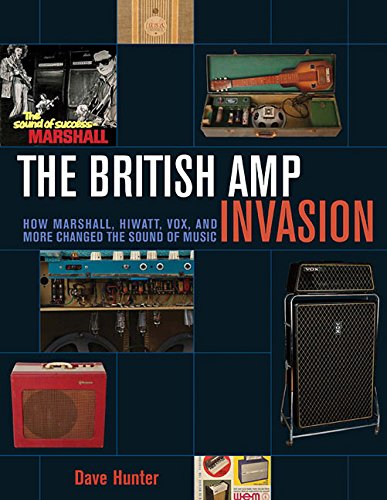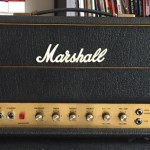 Dave Hunter’s latest book is entitled, The British Amp Invasion: How Marshall, Hiwatt, Vox, and More Changed the Sound of Music, and covers a span of the influence of British amplification from the late 1950s onward. As an industry, the companies behind the amplifiers are a fascinating study, not only from a design and sonic perspective, but also because of the stories themselves that surround their business success and growth (or for some, their bad deals and decline).
Dave Hunter’s latest book is entitled, The British Amp Invasion: How Marshall, Hiwatt, Vox, and More Changed the Sound of Music, and covers a span of the influence of British amplification from the late 1950s onward. As an industry, the companies behind the amplifiers are a fascinating study, not only from a design and sonic perspective, but also because of the stories themselves that surround their business success and growth (or for some, their bad deals and decline).
Continue reading
Tag Archives: Vox
Finding Your Distortion Tone (Hint: Mids)
 If only things were so easy that we could buy the guitar we felt comfortable with, plug into an amp, maybe add a pedal or two, and then be done. Tone Nirvana. It usually doesn’t happen this way however. The problem is that there are numerous choices for gear and, and even more options for putting together the whole rig, to create an effective system that is optimized. And just how we use the equipment (whether for live use or studio recording) also makes a difference in finding what works for guitarists.
If only things were so easy that we could buy the guitar we felt comfortable with, plug into an amp, maybe add a pedal or two, and then be done. Tone Nirvana. It usually doesn’t happen this way however. The problem is that there are numerous choices for gear and, and even more options for putting together the whole rig, to create an effective system that is optimized. And just how we use the equipment (whether for live use or studio recording) also makes a difference in finding what works for guitarists.
We recently wrote about the challenges with the Internet and its opinions. You can find as many people who will love or hate any particular piece of gear. This can become frustrating when trying to dial in a tone you’re interested in capturing.
Continue reading
Fuzz Feast Part 1 – An Examination of Vintage Fuzz Boxes
I have a confession. As a guitarist for well over 25 years, I had always been an “anti-fuzz” person. In fact, I can honestly say I hated and despised the sound of fuzzes that I had heard. I couldn’t understand the point of purposefully making a guitar sound as atrocious and “lo-fi” as possible in mind. A fuzz tone after all, sounded nothing like an electric guitar should.
During this period of time, my search for the epitome of rock tone had to do with capturing rock guitar tones from the likes of players like Angus Young of AC/DC and of course Edward Van Halen. In my mind, any tone that deviated from those was simply bad tone, or at best, “sub-par.”
Continue reading
THD Electronics Hot Plate Attenuator
It’s not a secret that nothing beats the sound of a great guitar tube amp cranked up. When a tube amp is driven to overdrive, rich and musical even-ordered harmonics flow in abundance and the amplifier seems to take on a new sense of dynamic character that responds better to a player’s touch. It is this feel that gives a tube amp an organic and natural sense, while solid-state amplifiers are considered more sterile in sound because of the lack of this response or harmonics.
The age-old problem has been getting the great tube amp sound at lower and more realistic levels. As the majority of musicians play relatively small clubs and in even smaller practice rooms, only the minority (i.e. those famous guitarists!) get the real opportunity to play these tube amps at the volumes that they sound best. As a result, many of our classic and much beloved Marshall, Fender, and Vox amplifiers are often seen used with distortion and fuzz boxes to compensate. While my personal belief is that these distortion and fuzz boxes are useful in some applications, they are certainly not the best way to achieve great tone when used strictly as the sole source of distortion.
Continue reading